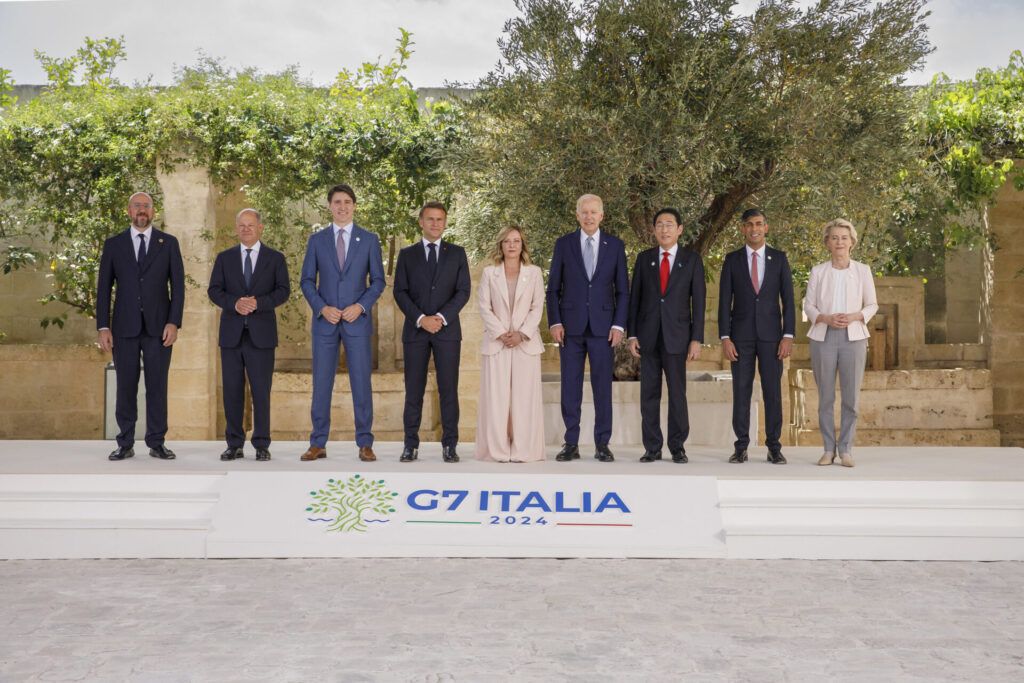Gender equality: Why is it still up for debate?
By Federica Dall’Arche | June 18, 2024
 Leaders (left to right) of the European Council, Germany, Canada, France, Italy, the United States, Japan, Britain, and the European Commission met in June 2024 at the G7 summit in Apulia, Italy. Credit: US Mission Italy
Leaders (left to right) of the European Council, Germany, Canada, France, Italy, the United States, Japan, Britain, and the European Commission met in June 2024 at the G7 summit in Apulia, Italy. Credit: US Mission Italy
Last week, reports emerged that the G7 leaders meeting in Italy were grappling with issues related to gender parity, including the recognition of abortion as a fundamental right. Unlike last year, when there was a clear and direct reference to “safe and legal abortion and post abortion care,” this year’s final statement did not include the word “abortion” and simply reiterated a general commitment to universal healthcare access for women, “including sexual and reproductive health and rights for all.”
This sad backtracking on women’s rights and gender issues is not unprecedented. Over the past few years, major multilateral fora, including those focused on nuclear issues, have seen unnecessarily protracted negotiations over the inclusion of gender-equality language in documents and resolutions.
For instance, during the 2023 Preparatory Committee of the Nuclear Non-Proliferation Treaty, countries spent hours debating the opportunity to insert paragraphs on gender balance, with some contending that encouraging the meaningful participation of women and minorities in negotiations was distracting and not pertinent to the discussion. A number of studies have already refuted this argument, demonstrating that the inclusion of women and minorities in negotiating processes brings more durable and effective results.
Similarly, during the International Atomic Energy Agency’s last General Conference in September 2023, Iran’s delegation held others hostage until 3:00 in the morning, refusing to adopt the resolutions being discussed unless all references to gender issues were removed. The situation became so absurd that, in desperation and exhaustion, the other delegations agreed to eliminate the references just to pass the resolutions, only to then take the floor and individually condemn this compromise as deplorable.
A similar scenario also played out recently at the International Conference on Nuclear Security 2024, where the same delegation opposed, this time unsuccessfully, the adoption of language relating to gender equality, language that had already been agreed to in the conference’s 2020 ministerial declaration.
Can nuclear negotiators still afford to waste time arguing over issues that are so fundamental that they should be undebatable and already considered set in stone? Is there really a need to approach topics like gender equality with “sensitivity,” fearing that any mention of female empowerment or gender diversity could be problematic? Shouldn’t negotiators already be at the point of discussing how to preserve and strengthen those few hard-won rights, with the aim of expanding them and making negotiation processes more inclusive for everyone’s benefit?
The mere fact that these issues remain contentious underscores a broader reluctance to fully embrace progressive values. This hesitation is not just a setback for minorities and women’s rights but for human rights overall. The broad, troubling pattern of regression in global commitments to gender equality is concerning and disheartening. The persistent reluctance to firmly endorse and promote gender parity and women and minorities’ rights undermines progress and casts a shadow over future diplomatic efforts. Equally dangerous is the willingness to accept blackmail and turn a blind eye to discrimination in order to pass a resolution.
And what to say when the leaders of the seven most powerful (and like-minded) nations are locked in negotiations over issues that should already be universally accepted? This sets a terrible, defeatist precedent.
The time for debating has passed. The international community must recognize that gender equality, in all its shapes and forms, is a non-negotiable issue and a fundamental right that should be unequivocally upheld. The world needs decisive actions and an unwavering commitment, not steps that take us back decades.
The international community must move beyond these regressive negotiations and recognize that gender equality is intrinsic to the health and progress of societies worldwide. It is high time for global leaders to demonstrate foresight, ensuring that issues of gender and women’s rights are integrated seamlessly into all facets of policy and diplomacy. This is not merely about women’s rights; it is about building a more just, equitable, and prosperous world for all.
Together, we make the world safer.
The Bulletin elevates expert voices above the noise. But as an independent nonprofit organization, our operations depend on the support of readers like you. Help us continue to deliver quality journalism that holds leaders accountable. Your support of our work at any level is important. In return, we promise our coverage will be understandable, influential, vigilant, solution-oriented, and fair-minded. Together we can make a difference.
Keywords: G7, gender equality, women
Topics: Nuclear Weapons, Opinion














